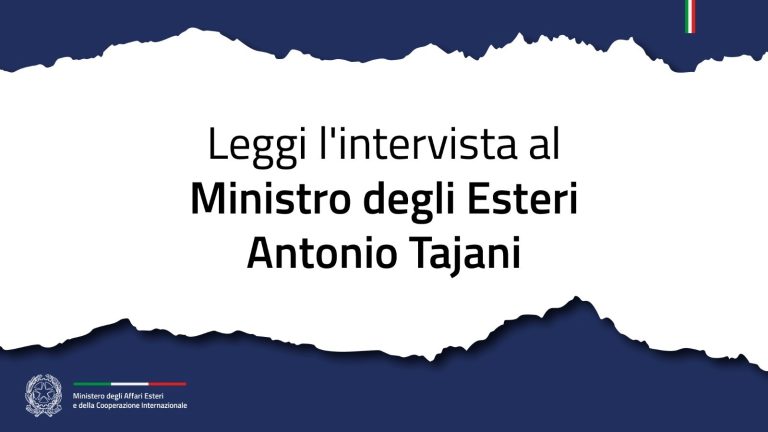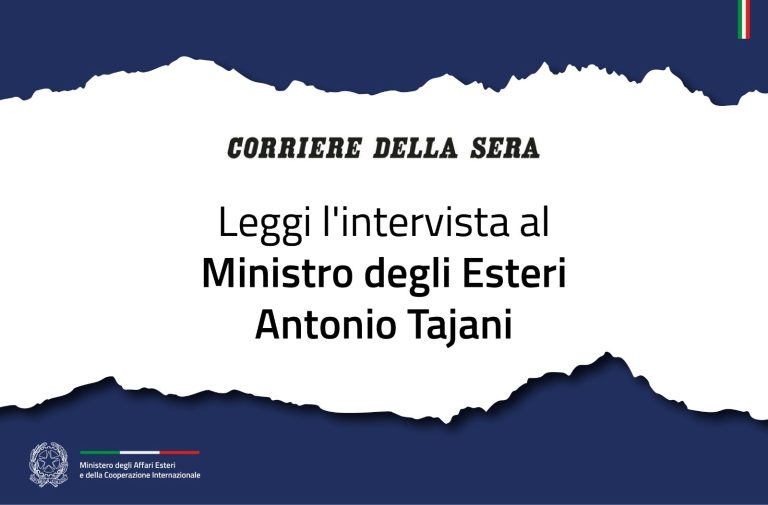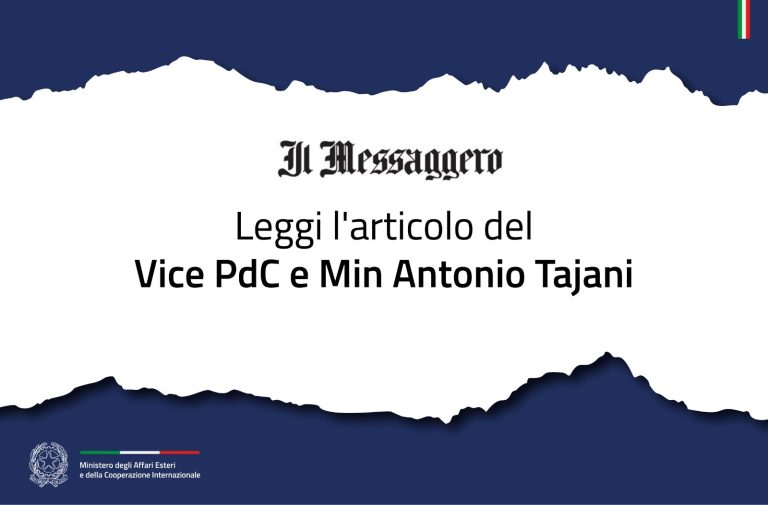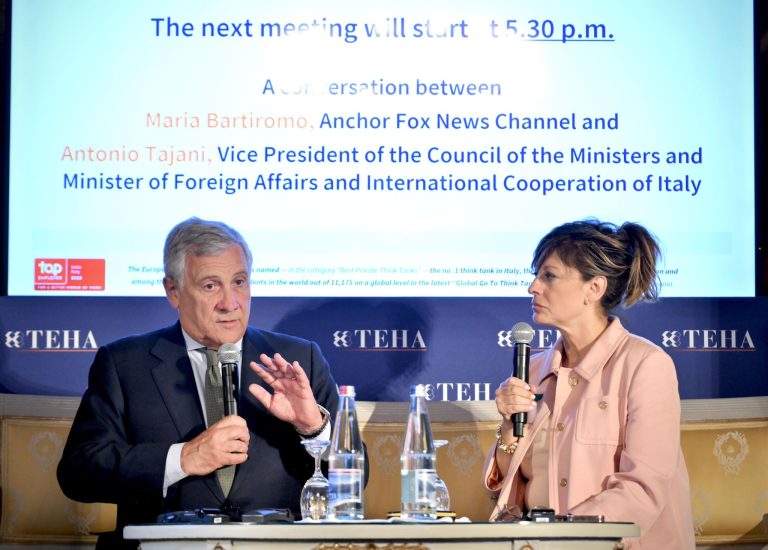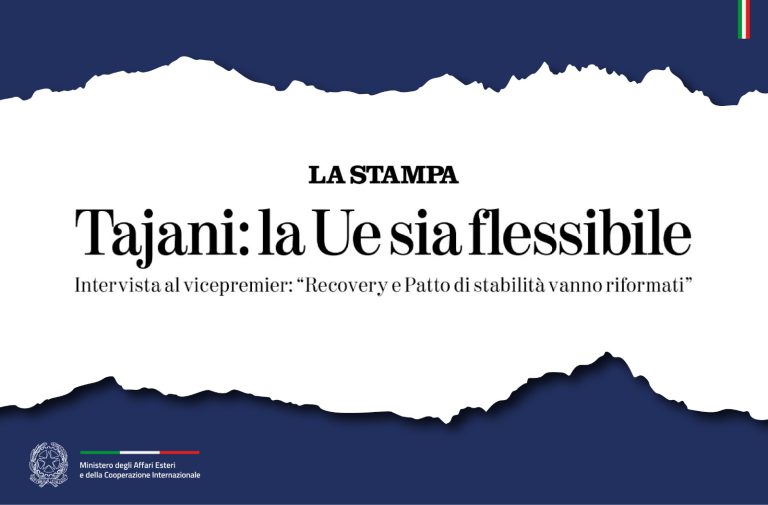CATANIA – From the war in Ukraine to the situation in Gaza, via trade tensions between Europe and the United States and the future of the Mediterranean area. Many topics were covered in this exclusive interview with Deputy Prime Minister and Minister of Foreign Affairs, Antonio Tajani, currently in Sicily – specifically in Noto, in the province of Syracuse – to attend the conference entitled “Forza Italia, Forza di Territorio”, held at the Hotel Sofia.
International political attention remains focused on the conflicts in Ukraine and Gaza. Despite difficulties, there seem to be glimmers of diplomatic progress: what role can Italy play in this scenario?
“We are all committed to bringing an end to the conflict and to stopping the suffering of the Ukrainian people. Last Monday in London, with my counterparts from the main European countries, we expressed hope that a direct meeting between Putin and Zelensky could be the first concrete step towards a ceasefire, a just peace that guarantees Ukraine’s future and greater security and stability in Europe. While Ukraine has shown willingness, Russia still refuses genuine negotiations. Putin believes he can still gain something by continuing to destroy Ukrainian cities day by day, mainly targeting civilian areas. Putin is wrong: he is destroying Ukraine, but also politically and economically harming his own country. He must open to negotiations”.
And Italy’s role?
“In any case, Ukraine’s future will also involve reconstruction. And here, our country is fully committed: on 10–11 July, Rome will host an international conference at head-of-government level. Last week in Verona, I chaired the fourth preparatory meeting dedicated to the local and regional dimension of reconstruction, attended by over 450 participants including local administrators, government officials, and Italian, Ukrainian and international companies – proof of the strong interest in this initiative. We are therefore aiming at both the political and material reconstruction of Ukraine: but first, Russia must begin peace talks to stop this devastating war”.
A heated international debate has arisen following tariffs announced by the US administration under President Trump, sometimes with very harsh tones. Italy could play an important mediating role between the US and Europe. What will be the strategy for reaching an agreement acceptable to both sides?
“EU countries conduct trade negotiations on tariffs through the European Commission, in particular via the Commissioner for Trade, Maroš Šefčovič, who was my colleague when I served as Commissioner and Vice-President of the Commission. This is because EU Member States wisely decided to delegate and centralise tariff negotiations in Brussels: we are a single market, and we are stronger when we act together. That said, Italy and I personally have contributed to the negotiations. Politically, we urged the preparation of potential countermeasures, sending clear messages to the US about the damage their tariffs would do to the global economy. But we also asked that this not be accompanied by aggressive rhetoric against the Trump administration. We needed negotiations, not attacks on Trump and his ministers. Recent signals suggest that the Trump administration is negotiating: initial agreements with the UK and direct talks with China are promising signs. So our strategy is simple: negotiate, negotiate, negotiate”.
In Gaza, the humanitarian situation is extremely critical. Bombing continues – what is Italy doing?
“Since 7 October, we have expressed full solidarity with Israel following the violent terrorist attack and massacre carried out by Hamas. However, as time has passed, we have also begun urging Israel to halt military operations that are costing many civilian lives. Our concern for the human cost to the Palestinian population has led us to launch our own national initiative, ‘Food for Gaza’. The priority now is achieving a ceasefire to stop military attacks, secure the release of Israeli hostages still in captivity, and provide immediate assistance to the civilian population. I discussed this last week with the Palestinian Prime Minister and Foreign Minister, Mohammad Mustafa, and with Israeli Foreign Minister Gideon Sa’ar. The Italian government has supplied over 110 tonnes of medical and food aid through ‘Food for Gaza’. In recent days, we’ve also approved a further €2.5 million in aid to support continued humanitarian operations. Since the beginning of 2024, a total of 393 Palestinians have received assistance in Italy, including 123 minors and 14 cancer patients. We’ve launched a project called ‘Educating for Peace’, which offers 97 scholarships in Italy to support the education of young Palestinians”.
You are in Noto, Sicily today. The island plays a strategic role in the Mediterranean. How can this be leveraged to benefit the country’s interests?
“Sicily is not just a physical location, an island in the heart of the Mediterranean: it is a ‘geopolitical’ space – an area where cultures, peoples, even ruling powers have historically converged, enriching one another. Arabs, Normans, French, Spaniards – over the centuries, they ruled but also contributed to the island’s wealth. Today, Sicily must recognise that its role is supported and strengthened by the whole of Italy – by the Government in Rome and the country as a whole. On 18–19 June, EU Foreign Ministers will be in Sicily, in Taormina, to commemorate the 1955 ‘Messina Conference’ held by the original six founding countries of the EU. We are returning to this symbolic place to reaffirm that the exceptional role of this ‘geopolitical island’ must be built together with the rest of Italy and Europe, which is the true shared home of the peoples of the northern Mediterranean. I am frequently in Sicily to show that the national government is here, alive and working for Sicily”.
Sicily has always been a stronghold of Forza Italia politically. What plans are in place to consolidate and revive its presence in the region, including through the regional government led by Renato Schifani?
“Forza Italia is the leading party in the centre-right coalition in Sicily. It’s the party of the Regional President, Renato Schifani, a key figure in our movement. We are strongly represented in the Regional Assembly and in all local bodies. But this strength comes with responsibility – it demands greater commitment. For the first time, a Svimez report has shown Sicily outperforming other Italian regions, including some in the North, in terms of GDP growth. Our mission must be clear: do everything we can to drive the island’s economic development. We must double our focus on the issues raised by businesses and entrepreneurs. The national government will do this first and foremost through investment in infrastructure – all aimed at ensuring economic and social development and security for our fellow citizens. Forza Italia wants Sicily to continue advancing – and to aim ever higher”.

